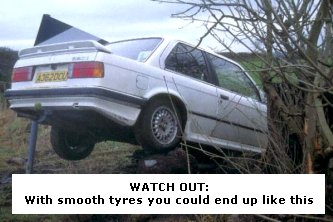Tyres Need More Attention Than You Think
 THE only part of a vehicle that is constantly in contact with the road
is the tyre. Yet, motorists pay less attention to it than it deserves. Many wait
for it to get absolutely bald before replacing it and many care little whether
the tyre is properly inflated or the correct size and type. If you are uncaring
about tyres, the advice from experts is that you change your attitude now. It
could well save your life. After all, safe tyres make for a safer trip. THE only part of a vehicle that is constantly in contact with the road
is the tyre. Yet, motorists pay less attention to it than it deserves. Many wait
for it to get absolutely bald before replacing it and many care little whether
the tyre is properly inflated or the correct size and type. If you are uncaring
about tyres, the advice from experts is that you change your attitude now. It
could well save your life. After all, safe tyres make for a safer trip.
Also, think twice before overloading your vehicle. It can cause a
great deal of pain to your tyres and other parts of your vehicle. It can not
only hurt your pocket, but also deprive people of their lives. And our road
network also takes a hammering in the process. Each year overloading causes
damage amounting to millions of rands.
What to watch out for
- Tyre Pressure: Make sure that the tyres are inflated to the correct pressure,
especially the rear tyres. Low pressure causes excessive flexing resulting in
overheating, tyre stress and failure
- Smooth Tyres: They limit road-holding capability, especially in rain, and
often cause skidding and even loss of vehicle control
- Check Tyres: Replace smooth tyres. The tread depth should not be less than
1mm at any given place. The camber settings must be correct or you will have
irregular tyre wear. The wheel nuts must also be properly tightened
- Tyre Types: Your tyres must match your vehicles. For minibus taxis the
following will apply: radial ply makes for a smoother ride, increased tyre life,
improved road holding and fuel saving; the strongest and most recommended tyre
is the Commercial Radial Ply, which is marked with a "C".
Overloading and tyres
Overloading, combined with defective tyres, can be a lethal
combination. At a time when minibus taxis have become a mode of transport for
millions of South Africans, the dangers surrounding overloading needs to be
brought home loud and clear. An overloaded taxi or bus may bring in extra Rands,
but what must be remembered is that its cost to taxi and bus users may well be
their lives. It should never be tolerated.
The dangers of overloading
-
An overloaded vehicle takes longer to stop, making it
dangerous in an emergency
-
It is more difficult to handle and cannot accelerate the
way it should, making it dangerous in situations where overtaking is
involved
-
At night, the headlights of an overloaded vehicle will
tilt up, blinding the drivers of oncoming vehicles to possible debris or
obstructions on the road
-
Tyres can flex and overheat and result in a blow out
-
It also hits the pocket because of higher maintenance
costs. Tyres, brakes and shock absorbers need to be replaced more frequently
-
Overloaded vehicles damage roads and can result in heavy
fines

 back back
|
 THE only part of a vehicle that is constantly in contact with the road
is the tyre. Yet, motorists pay less attention to it than it deserves. Many wait
for it to get absolutely bald before replacing it and many care little whether
the tyre is properly inflated or the correct size and type. If you are uncaring
about tyres, the advice from experts is that you change your attitude now. It
could well save your life. After all, safe tyres make for a safer trip.
THE only part of a vehicle that is constantly in contact with the road
is the tyre. Yet, motorists pay less attention to it than it deserves. Many wait
for it to get absolutely bald before replacing it and many care little whether
the tyre is properly inflated or the correct size and type. If you are uncaring
about tyres, the advice from experts is that you change your attitude now. It
could well save your life. After all, safe tyres make for a safer trip.